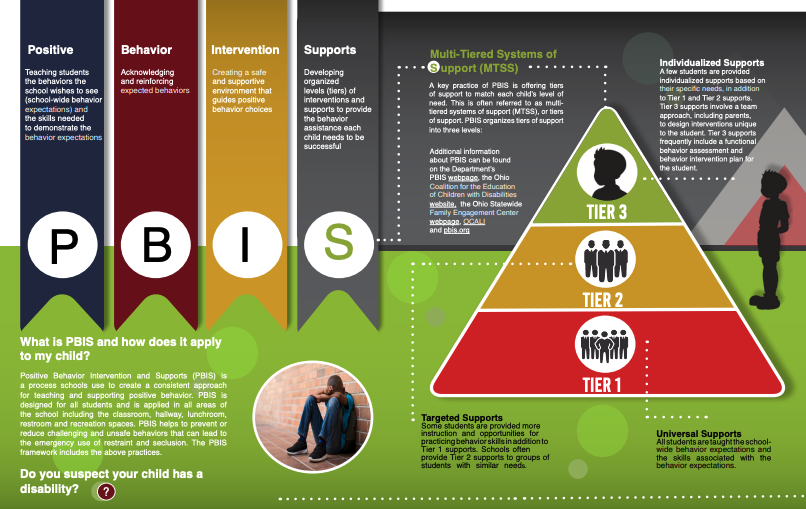The Pyramid of Interventions
The Pyramid of Interventions is an educational process that uses both prevention and intervention strategies to assist students in the school setting.
This process addresses academic and behavioral concerns for all students, in all schools, every day and serves as the foundation of Positive School Culture in Middletown City Schools. Each school in the Middletown City School district has identified academic and behavioral expectations that are clearly posted in all schools. Each school has also developed a customized set of supports and services to meet student needs.
To learn more about "Restraint and Seclusion, Positive Behavior Intervention and Supports (PBIS) in Ohio Schools," click here.
Levels of Intervention
The Pyramid of Interventions allows staff to provide supports for all students. In addition, it also provides increased supports for those students who may need more. The levels of support provided are as follows:
Tier 1
Supports all students in the school setting.
Tier 2
Provides targeted, small group supports for students who need more targeted assistance.
Tier 3
Provides intensive, individual support for students who need the most support. The supports provided in this tier are driven by the results of assessments.
Below are a few scenarios that illustrate how the Pyramid of Interventions can be used to support student academic and behavioral concerns at each level.
Tier 1 – Supports for ALL Students
| Academic Concern: |
Behavioral Concern: |
|
My child…
- gets bad grades on assignments.
- doesn’t finish work in class
- complains that homework is too hard
- does not turn in homework assignments
- says schoolwork is too easy
|
My child…
- seems to get into trouble all the time
- complains about being bullied.
- is bored and doesn’t want to go to school
- gets good grades but is disruptive in class
|
| Recommendation: |
Recommendation: |
- Parents and teachers work out ways to share information about the student’s work
- Teachers re-teach skills that some students missed
- Teachers add support materials to the classroom curriculum for all students
- Teachers provide more time in class for students to practice skills
|
- Parents and teachers work out ways to share information about the student’s behavior.
- Teachers teach behavioral expectations
- Parent support and reinforce behavioral expectations at home
- Teachers and parents reward students for positive behavior
|
Tier 2 – Targeted Group Supports
| Academic Concern: |
Behavioral Concern: |
|
My child…
- is behind in class work and
cannot keep up
- takes too long to do homework and needs a lot of extra help at home
- gets poor scores on tests
- seems to be having more trouble
with schoolwork than peers.
- gets high scores on tests and
low scores on homework
assignments or does not
complete homework at all
|
My child….
- was sent out of class at least twice in the past month
- makes excuses to avoid going to school
- seems to have trouble getting along with classmates.
- has been sent home early from school
- does not socialize well with classmates
|
| Recommendation: |
Recommendation: |
- Teachers discuss student
concerns with IAT
- Teachers provide opportunities
for students to practice
grade-level skills in small
groups, 30 minutes per day,
2 to 3 times per week
- Teachers collaborate with special education staff to receive
additional help and learn strategies to work with diverse learners
- Teachers chunk assignments and provide smaller amounts of
homework that target speci?c skills
- Parents check you’re your school to find out if after-school / enrichment programs are offered
|
- Teachers discuss student concerns with IAT
- Teachers re-teach behavioral expectations and ensure that expectations are shared with parents
- Parents contact school to find out of counseling sessions are offered
- Parents and teachers provide rewards and incentives for good behavior
- Parents and teachers immediately address undesired behaviors and model desired behaviors
|
Tier 3 – Individualized Supports
| Academic Concern: |
Behavioral Concern: |
My child…
- is getting more frustrated with
school every day
- can’t keep up with class work and doesn’t seem to understand
what the teacher expects
- frequently noticed for weaknesses rather than strengths
|
My child…
- is having behavior problems that seem to be getting worse.
- has been sent to in-school suspension programs multiple times
- refuses to go to school.
- requires me to miss time from work because of parent conferences
|
| Recommendation: |
Recommendation: |
- Teachers reconvene with IAT to discuss increased supports
- Teachers invite parents to meeting and get permission to engage in more intensive supports / testing
|
- Teachers reconvene with IAT to discuss increased supports
- Teachers invite parents to meeting and get permission to engage in more intensive supports / testing
- Functional behavior assessment conducted
- Behavior intervention plan developed
- Teachers teach / model alternative behaviors to replace disruptive behaviors
|
Parent Support is Critical
As with all educational endeavors, parent support is critical for student success. To support this process, you should …
- Talk to your child’s teacher about your concerns
- Set a timeline for regular follow-up
- Volunteer and/or observe in your child’s classroom/school
- Learn about the academic/behavioral expectations for your child’s grade level and discuss these with your child
- Begin keeping a behavior and academic
- Stay involved and engaged at all times
- Do not hesitate to ask questions
- Follow up with any evaluations or appointments that Intervention
- Continue working with the team until you are satis?ed with the plan developed to help your child
Lastly, if you are unable to resolve matters with your child’s teacher request a meeting with your child’s principal



